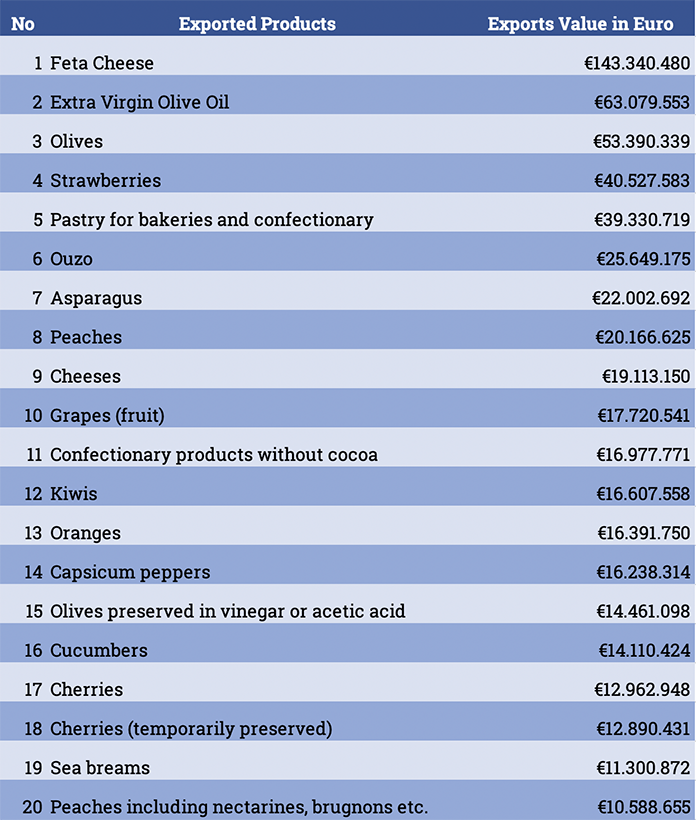When we discuss exports, especially in the food and beverages (f&b) sector, the willingness to export is not enough. Producers should take into consideration parameters, among which the demand for certain products, often defined by national or/and international nutritional trends, the production capacity, the competition, the laws and restrictions of food imports of each country. Dr. Nikolaos Belias, Head of the Munich Economic and Commercial Affairs (ECA) Office, answers Ambrosia Magazine’s questions on optimum export practices.
Interview: Charitomeni Vonta
What is the footprint of the f&b sector in the overall Greek industrial production and where does Greece stand in terms of exports to Germany?
It would be appropriate to say that the food and beverage sector is a leading sector in Greece. Compared to an average of 15% in the European Union, the Greek f&b covers 35% of industrial production, while agricultural production represents 5.1% of added value, respectively, compared to 2.7% in the European Union.
Greek food and beverage exports increased by 60% in the last decade, and now account for 23% of product exports compared to an average of 7% in Europe. The agri-food sector also showed impressive resilience during the pandemic period: last year alone there was an increase in its exports by 11%.
Germany and Italy are our largest export markets. In Germany, Greek f&b exports increased by 115 million euros last year, reaching 845 million, which corresponds to 38% of total Greek exports to Germany. In the table below we see the 20 most important Greek export products in the agri-food sector. A particularly significant increase occurred the last two years in the exports of fruits and vegetables, dairy and olive oil.
Is there a sector that you believe could improve, and if so, what, in your opinion, could be done in order to enhance exports?
In the last twenty years, changes have taken place in the field of retail trade, due to the expansion and strengthening of the role of large retail chains, leading to only a few of Greek agricultural products currently holding significant shares in the German market. Indicatively, imports concern asparagus, olives, cucumbers, peppers, fresh grapes, kiwis, strawberries, peaches, cherries, apricots, citrus fruits (with a share of 1.9% compared to 72% in Spain), watermelons and melons (1.4% of German imports, while Spain has a 53% share).
Truth be told, a large part of the problem stems from the long-standing problems, which we all know, of the productive structure of the agri-food sector in our country.
Indeed, there are problems such as the fragmentation of the agricultural clergy, the small size of agricultural holdings compared to our competitors, the devaluation and shrinking of the role of cooperatives, the limited brand awareness and seasonality of our products, the fact that we insist in using varieties with declining demand in international markets, high transport costs, the limited bargaining power of producers and traders against large international networks and the insufficient integration of technological innovations.
These problems do not allow us to make sufficient use of the favorable climatic conditions, the quality of the soil and the high taste and nutritional value of our products. If we should see changes in the exporting shares, then we should attentively address the aforementioned, one by one.
How about the access to major super market chains?
It should be noted that few producers or exporters are able to sell directly to large chains. LIDL may be an exception to this rule, as it gets products from Greece, covering 5–10% of Greek food exports, according to representatives of the group. Other groups, such as EDEKA, have their own import companies with subsidiaries in Spain and Italy that supply directly all stores belonging to the group.
Indeed, the presence of private label products in retail is worth mentioning, in both discount and other super markets. The turnover of private label products is more than 1/3 of the total turnover of retail, while in discount stores, such as ALDI, only 12% of the turnover is made with branded products (about 25% in LIDL, respectively).
Assessing other parameters, such as the pre-suppliers (Vorlieferung) system, and several tests that companies and products have to pass, in order to supply big chains, it is perfectly understandable why only a few Greek products have been successfully included in the list of approved suppliers of large groups -we are mainly talking about products with great brand awareness (such as feta, yogurt, oil, olives).
Given all these setbacks, is there an actual perspective to improve the presence of Greek products in the German market?
In our view, despite the difficulties and problems mentioned above, there is huge scope for expanding the presence of our products in the German market. Fruit exports, for example, could, under certain circumstances, regain much of the lost ground and approach their former market shares.
Products whose share in the German market remains limited, such as olive oil, cheese products, fish, bakery products, honey, herbs, wine and other spirits have similar prospects.
To cite just one typical example, as shown by the study on Greek yogurt conducted by the Secretary of our Office Mr. George Lymperis, the so-called “Greek type yogurts” take up for about 1/3 of the space for yogurt on the shelves of large chains of big super markets.
In order to secure access to the German market, Greek exporters should move in an organized, systematic and targeted manner. The German market is not open to fragmentary actions and opportunistic behaviors.
What would you say is the greatest asset of Greek f&b products in the German market?
Τhere are about 20 Greek importers and distributors of f&b products in Germany, with a turnover of 5 to 50 million euros each, who also have retail outlets. These companies import all kinds of Greek products and they supply (accounting for an impressive 70 to 80% of their sales) thousands of Greek restaurants, but also other HORECA stores, mini markets and grocery stores.
Here lies a great asset of our exports. It is estimated that there are about 6,000 Greek restaurants in Germany, almost half of which are located in Bavaria and Baden-Württemberg. Greek restaurants are very popular due to the large number of German tourists who visit our country.
According to market experts, Greek restaurants absorb 50 to 60% of the processed food we export to Germany. In fact, if we take everything into account (Greek restaurants, importers, Greek wholesalers and store managers), it would not be an exaggeration to say that 70 to 80% of our exports are directly related to what we would call the “Greek distribution channel”. That, we believe, is our greatest asset.
What are the targeted actions taken to improve the position of Greek f&b products in the German market?
We believe that the access of Greek food and agricultural products to the German market can be improved, and a way to achieve it is through promotion programs of the main Greek products (cheese products, olives, wines), which are already taking place and should be continued. These programs include actions such as in store promotion, cooperation with cooking schools, wine tasting, buyer invitations, entries in specialized publications, etc.
Equally important is the organization of events, in collaboration with Enterprise Greece and other institutions, such as the event in June and July 2022, organized by the Munich ECA Office with the delicatessen Käfer group.
The products available at the Käfer Group’s stores meet the preferences of German customers for fine, original, and genuine premium food products. It is crucial that they consist of natural ingredients with as few preservatives and additives as possible, and that they have been produced under very strict quality control standards.
In addition, the group is looking for products from selected, small producers and organic products that stand out, while besides the taste, emphasis is also given to the packaging and the aesthetic presentation of the product.
About fifteen products have already been selected (such as extra virgin olive oil, salt flower and bottarga, dairy -feta and ladotyri from Mytilene-, nuts, decoctions, pasta -traditional kritharaki- and wine). A total of 70 products have been selected with the active assistance of our Office, Enterprise Greece and major importers of greek products in Germany.
Office E.C.A. Munich – Contact Details
Möhlstr. 22, D- 81675 München, Germany
Telephone: (0049 89) 9988 6718
Fax:(0049 89) 409 626
ecocom-munich@mfa.gr


















 Greek exports of agricultural products, food and beverages in Germany within the year 2021 in euros
Greek exports of agricultural products, food and beverages in Germany within the year 2021 in euros Dr. Nikolaos Belias on the podium of a recent event of the Greek Economic and Commercial Affairs (ECA) Office in Munich.
Dr. Nikolaos Belias on the podium of a recent event of the Greek Economic and Commercial Affairs (ECA) Office in Munich.
